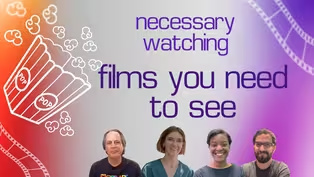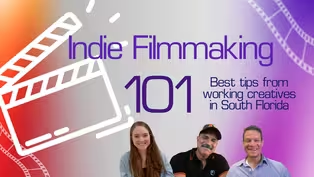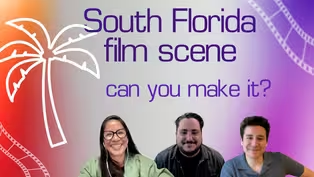Film Making 101: Tips from South Florida Indie Filmmakers
Clip | 13m 16sVideo has Closed Captions
Filmmakers from South Florida PBS’s film-maker project share their tips and advice for filmmaking.
Filmmakers from South Florida PBS’s film-maker project share their best tips and advice for indie filmmaking. These South Florida creators are creating dynamic, entertaining, and personal narrative and documentary films.
Problems playing video? | Closed Captioning Feedback
Problems playing video? | Closed Captioning Feedback
film·maker is made possible by: National Endowment for the Arts Art Center South Florida South Florida PBS Arts Challenge Art Center South Florida Lydia Harrison Alfred Lewis The Dunspaugh-Dalton Foundation
Film Making 101: Tips from South Florida Indie Filmmakers
Clip | 13m 16sVideo has Closed Captions
Filmmakers from South Florida PBS’s film-maker project share their best tips and advice for indie filmmaking. These South Florida creators are creating dynamic, entertaining, and personal narrative and documentary films.
Problems playing video? | Closed Captioning Feedback
How to Watch
is available to stream on pbs.org and the free PBS App, available on iPhone, Apple TV, Android TV, Android smartphones, Amazon Fire TV, Amazon Fire Tablet, Roku, Samsung Smart TV, and Vizio.
Providing Support for PBS.org
Learn Moreabout PBS online sponsorshipthat's a good question something you should always have on set is fresh cafesito especially if you make a cfao fresh like on set um and they like they smell it being made and they see it being poured and they're like they wait the moment that they like get handed their little cup it's really nice um for everyone to just take a 5 minute break together and drink the little coffee and then go back on their way it makes you feel thought of and warm and nurtured a little bit I know I felt that way when I was having myo in between takes so first of all confidence sometimes you can go on a day as a director and if you don't wake up with confidence of what you're doing um then it becomes really hard something you should always have on set especially during the summer I would say are tarps you know you get there early in the morning it's super sunny and then by 1: or 2 p.m. it's raining so definitely tarps to cover the gear camera gear uh definitely NE necessary and water the things that you should always have on set are those that will make your production team most comfortable whether it be an extra camera extra batteries but definitely a way to help sustain them because the hours get long a crew well fed goes a long way you need to make people happy and Foods makes everybody happy so that's what I've learned you know is that you should always you know treat people well feed people well and always have something to eat and drink on set is really important for everybody's mental and physical physical health so set foods for sure when you're on set you always need to have a plan B and a plan C things happen on set depending on what you're working you know big crew or small crew or documentary or scripted I feel like you should always have a backup plan in case things don't go as you want it you know you have another way to do things and hopefully you know get the coverage you need um I think it's important to bring all your confidence and know what you're doing and um and treat people very well I would say patience uh spirit of collaboration for sure and um and people who care just people care and people who listen to one another a positive attitude you have to have a positive attitude it's infectious and your team needs you you are a leader if if you're the director or if you're a producer even more enjoying the moment although it might be stressful and things are going on and maybe things aren't going the way you want them to be exactly how you want them or thought about them going you always have to have a positive attitude enjoy the moment because this is what we live for each time that I work on a project especially as a director which is something fairly new to me um I learn things so like now I try to do a little bit more pre-production um try to maybe find a story before we go into production and with documentary is a little bit tricky because you might have an idea but then as you're doing the interviews you know they might say something that you didn't think of or um you know you have to be open to change it was the first time where I kind of took a step back and I was able to allow the cast members um to bring in an improv to the set that just added layers to the film and then the crew as well or every every single position it wasn't it wasn't a matter of hierarchy every single position was able to give in their input seeing everyone give their part that was to me um the first moment where I realized it's it's better when you when you let go of control and you allow for other people to to give in their their input as well they made a huge difference I think I underestimated my production Parts my producers part of this film because I had producers obviously but as a director you are the leader of the set you have to take care of people you have to take care of your crew and I feel like because I had so much to do I could have also put my producers hat sometimes a little more to make sure everything was running smoothly because yeah I think I was sometimes too focused on some you know little aspects and I couldn't see the big picture so I you know learned how to do that and I think think if I would do it again I would do it differently for sure definitely make sure that the props are uh working definitely have more Pas than you want on set CU you never know when you'll be short-handed at times you know one PA goes to get the food or one you know goes to get you know certain pieces of equipment and then you actually need one or two Pas like on set so you know I think the more the the more the better I love being a director I am the way in which stories are shared with the world I think that it's a huge responsibility and it's one that I really take on uh with a lot of Integrity with the best of my work ethic that I can offer people think that an editor is just giving directions but you're really making a cohesive team of Professionals of vendors of different departments and helping them use each of their individual strengths in order to create this project that we can all be proud of it means being self-aware of your responsibilities on set to your cast and to your crew to the overall story and also to the audience to me being a director is um a big responsibility because as you know someone that makes documentaries I want to honor my character stories and there's a responsibility behind that you know you have to be responsible in the way you tell their story you have to be responsible the way that it's edited make sure that you know you're not changing anything uh to create you know a story that it's not really there so to me is a big responsibility and I want to make sure that you know whoever I'm working with it's um you know it's happy with the work and uh that I basically honor their story it's been super responsible for the for the story of someone else so um so it's a huge commitment it's it's important it's it's it's exciting to be a director it feels nice it feels good but also I think it comes a lot of responsibility I have the the the work of of of of the relationship with my character and that's very important for me to to create this relationship even before bringing a camera with me um we need to talk we need to get closer a camera could be really it is intimidating so for me being a director is really it what it comes down to what down to is just being a a master Storyteller and that's something that I I try to Aspire aspire to um as a filmmaker is just tell that story and whatever it is you're always trying to I think take the viewer on a journey and and reach some sort of Truth as a director you really have to appreciate everybody that's coming together to bring your vision to life and uh you have to make sure that everybody's good everybody's having a good time and and doing your part and lead them to the Finish Line you have to carry your casts you have to carry your crew and you have to translate your passion so that other follow you and help you to do your project because at the basis it's yours but it becomes everybody else because you're you're able to lead them through it for me what it means to be a director is just to create cool things that I want to create create store St that I want to create uh especially stories that take place in Miami you know you have that ability to create within that art within that space uh stories that you want to tell and I think that's that's super important the job of being a director is really about trusting everyone on set while at the same time encouraging them to trust each other and to trust you you know because it's not so much that you're creating the project you're you're trying to bring out the best in everyone so that they can do the thing they need to do in order for the whole team to thrive and for the whole project to thrive so it's really about guiding and trusting um everyone who helps you along the way sometimes it's deadline that makes you just finish something I feel like some sometimes your stories aren't finished you know you and that's why you see these you know part ones and part twos these sagas um because you can really when you create amazing characters and amazing worlds that can go on for a long time the story has never finished never as an artist it's so hard to walk away from the canvas it really really is it seems like with documentary it's never finished and you're always working on the project I guess if you have a resolution that's that's the goal like you know if you have some sort of conflict and then that person's going through something and you can film that whether that's a good outcome or a bad outcome um but you do have a resolution you know what the result is going to be you know what the final outcome is going to be um I feel like if you can close a chapter then the story it's it's done um my story is finished when either I can't think of anything else to do to it or I run out of time to write it believing in the message and not trying to make movies long because you have the minutes and the footage um you know sometimes you just got to compact everything and be direct the saying is that movies are abandoned they're never finished so you can you can go on forever and and and kind of Tinker with a film but at some point that baby needs to go out point I would say when all the questions have been answered and you just and you're tired of it time to move [Music] make something that looks like you don't try to make things to make things or don't try to make things that you think would you know people would like because in the end of the day there's a lot of you know different opinions in this world and if you don't make something that's significantly important to you and is personal it's going to feel like it doesn't have a heart be humble and and make as many friends and connections um as possible cuz they can last a lifetime the more pre-production you do the easier your life will be uh in postproduction po all your honesty or your love um when you're are making a film if you've got an idea write it down and try to make it happen and if you can find somebody to fund it congratulations the best advice I I I received as a filmmaker is believe in yourself tell stories that only you can tell make them as nuanced as specific as possible people will essentially always understand a human story but it's on you to put in those special details that maybe only you know because of your age or maybe you know because of a music genre that you love or because of the culture that you grew up in your story is the most important one we're comfortable shoes absolutely just be open to you know to things happening and and seeing what develops from from feeling and just hanging out with people things are not always going to work out perfectly and um it's going to you there's going to be things on set that you're going to have to deal with but that doesn't take away from the fact that you're still going to you can still have an amazing time doing it you know expect the unexpected that is film making there is always going to be a solution that is the beautiful thing about film making that is very more and at the moment when you're on set if something doesn't go exactly the way it's supposed to go you figure it out you find a solution to that problem and and you keep going don't be afraid to fail uh you're going to fail I know a lot of people are very precious about their stories and you know it has to be the right time or with the right people and you know the right script but I I personally say just just just makees stuff because you're going to fail you're going to make you know you're going to make great movies you're going to make good movies and you're just going to make movies uh and that and that's and that's totally fine [Music]
South Florida Filmmakers Share Their Must Watch Films
Video has Closed Captions
Clip | 16m 1s | South Florida filmmakers give their top picks for essential viewing. (16m 1s)
Film Making 101: Tips from South Florida Indie Filmmakers
Video has Closed Captions
Clip | 13m 16s | Filmmakers from South Florida PBS’s film-maker project share their tips and advice for filmmaking. (13m 16s)
Can You Be a Successful Filmmaker in South Florida?
Video has Closed Captions
Clip | 5m 57s | Is it possible to be a successful filmmaker outside of hotspots like New York and Los Angeles? (5m 57s)
Providing Support for PBS.org
Learn Moreabout PBS online sponsorshipSupport for PBS provided by:
film·maker is made possible by: National Endowment for the Arts Art Center South Florida South Florida PBS Arts Challenge Art Center South Florida Lydia Harrison Alfred Lewis The Dunspaugh-Dalton Foundation


















